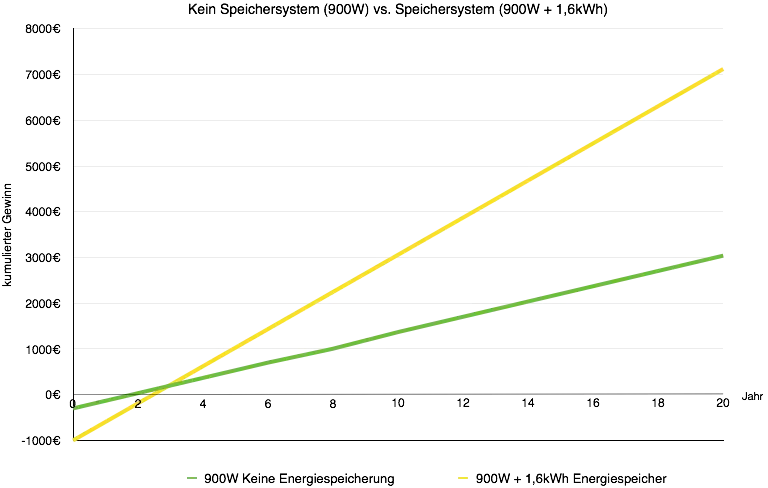Is a battery storage worthwhile for a balcony solar system?
With the growing popularity of balcony solar systems—driven by reduced electricity costs and the use of renewable energy—a new question arises: Should one also invest in a storage unit for this mini-solar setup?
Solar battery storages are designed to store excess solar energy generated during the day and make it usable in the evening. This way, every bit of energy can be maximized. But is this additional investment truly worthwhile? In this article, we examine the conditions under which a battery storage is recommended for a balcony solar system, how it boosts efficiency, and which households can particularly benefit from it.
When is a battery storage worthwhile for a balcony solar system?
PV (photovoltaic) systems generate the most electricity during the day when sunlight is strong—but this period does not align with peak electricity demand. Many households are empty during the day, as residents are at work or school. Electricity consumption is concentrated in the evening hours—precisely when the PV system no longer produces power.
Without a storage unit, excess solar electricity generated during the day can only be fed into the power grid very inefficiently. In the evening, households then have to use expensive electricity from the grid. This “sell cheap during the day, buy expensive in the evening” model makes the entire setup highly unprofitable.
A battery storage solves this problem by storing the electricity generated during the day and making it available in the evening. For households looking to maximize their self-consumption of solar power and reduce their electricity costs, a storage unit is the ideal complement to a balcony solar system.
The investment is particularly worthwhile under the following factors, when:
- You have high energy demand: Households with high electricity consumption benefit the most. The storage unit not only reduces electricity costs but also serves as an emergency power supply in case of a power outage.
- You need budget planning: While storage units increase the initial investment, they will amortize over the long term through reduced electricity purchases and higher self-consumption of solar power.
- You want to do something good for the environment: Storage units improve the efficiency of solar power utilization and lower the carbon footprint—ideal for households focused on sustainability.
- You have limited space: Even with restricted space (e.g., on a balcony), compact · storage solutions enable efficient use, making them perfect for urban apartments or rental properties.
All these points make a battery storage unit suitable for most people and a worthwhile investment.
Does a battery storage increase self-consumption? If so, how?
Yes, a battery storage significantly expands the functionality of a balcony solar system: it stores the electricity not needed during the day for later use. This works thanks to an intelligent system consisting of a Battery Management System (BMS) and a controller—essentially the “energy dispatcher” in the home.
During the day, the solar system covers the electricity consumption for devices such as refrigerators or lamps.
Excess energy is stored: When energy generation exceeds consumption, the excess is not fed into the power grid but directed to the storage unit.
In the evening: When consumption is highest, the storage unit supplies electricity for lights, TVs, computers, and more.
This “load shifting” reduces the amount of electricity drawn from the grid, significantly increases the share of self-consumed energy, and thus lowers electricity costs.
Which households will benefit most from a battery storage?
The following households will benefit particularly:
- Dual-income/working households: Those who are out of the house during the day use little electricity in the daytime—the storage unit perfectly covers evening energy needs.
- Households with high evening electricity consumption: Those who use washing machines, dryers, or dishwashers in the evening, or charge electric vehicles, will benefit greatly from a storage unit.
- Off-grid energy users: Those who want to be independent of the power grid need a storage unit as the core of their energy self-sufficiency.
(A storage unit is not necessary for households that have time to consciously consume electricity during the day—such as retirees or self-employed people who do laundry, cook, or use appliances during daytime hours.)
How does a rising electricity price affect the profitability of purchasing a battery storage?
The higher the electricity price, the more worthwhile a battery storage becomes. Currently, electricity prices in Germany range between €0.35–0.45 per kWh—and they will continue to rise. This is driven by factors such as the CO₂ tax, prevailing energy policies, and geopolitical conflicts.
A battery storage allows you to store free solar electricity generated during the day, replacing expensive grid electricity in the evening. In this way, every stored kilowatt-hour acts as a “protection” against future price increases.
In short, the higher the electricity price, the faster the purchase of a battery storage amortizes. A short-term financial outlay is converted into a profitable investment in a very short time.
How does a battery storage contribute to independence from the power grid?
In addition to cost savings, there is another key reason to invest in a battery storage: energy independence.
Grid instability is a major issue, particularly in Germany—whether due to excessive load or blackouts. For this reason, a battery storage becomes the backbone of energy supply, offering the following benefits:
- Emergency power supply during outages (UPS function, Uninterruptible Power Supply).
- Reduced reliance on the centralized power grid, thereby ensuring personal energy security.
With a battery storage, a balcony solar system transforms into a genuine on-site energy source for your home.
What costs are associated with a battery storage?
Naturally, a battery storage also incurs costs, which include:
- Initial purchase costs: Approximately €400–800 per kWh, depending on the brand, capacity, and technology.
- Battery aging and replacement: Lithium-ion batteries typically last around 10 years and may need to be replaced after this period.
- Charging and discharging losses: While losses during charging and discharging are very minimal, they should still be considered when making a purchase.
Tip: Opt for modular systems with good value for money, such as the INDEVOLT BK1600. These systems can be flexibly expanded and operated cost-effectively with subsidies.
Does a battery storage extend the payback period of a balcony solar system?
Naturally, the payback period is the most critical question when considering an investment in a battery storage. However, this cannot be answered universally, as it always depends on a variety of factors. Electricity prices, the location and its sunlight exposure, maintenance costs, and even government subsidies for solar systems—all these factors influence the payback period.
Below is a calculation example to illustrate the payback period:
The graph below shows the different payback periods with and without storage. Assuming an electricity price of 40ct/kWh, a solar system with an output of 9000W and a storage system with a capacity of 1.6kWh at a price of €1000.

It should be noted that the additional costs for the storage unit are recouped after just 1.8 years. It is also clear that investing in a storage unit is more than worthwhile in the long term, as its profit margin is significantly higher than that of a solar system without storage.
Does storage make sense even for small systems?
Yes – even for small systems (600–900 W), storage can be worthwhile. The decisive factor is not the size, but rather:
- Is there surplus electricity during the day?
- Is there constant consumption in the evening?
Yes – even for small systems (600–900 W), storage can be worthwhile. The decisive factor is not the size, but rather:
- Is there surplus electricity during the day?
- Is there constant consumption in the evening?
Even 0.5–1 kWh per day can contribute significantly to reducing electricity costs. In addition, many systems are modularly expandable – such as the INDEVOLT BK1600 Ultra, which starts with one module and can be combined with up to three.
Conclusion
The combination of a balcony solar system and storage unit is becoming the path to energy independence for many households.
Whether to reduce electricity costs, increase self-consumption, hedge against price increases or as a sustainable lifestyle choice, electricity storage units offer real added value. Despite higher initial costs, they make economic and ecological sense in the long term.
Those who invest today will reap double the benefits tomorrow – both financially and ecologically.





